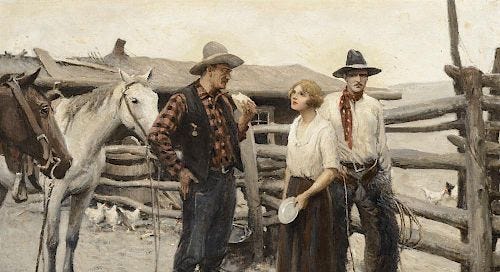Trails of Thought, III: Outlaws and In-Laws
A series of occasional bite-sized musings on the history of the American West.
I have never been interested in famous outlaws, but over the last couple years I've ended up reading a couple of nonfiction books about them, because I am fascinated by the fact that the demise of two of the Old West's most famous outlaw gangs—the James-Younger gang in Northfield and the Dalton Gang in Coffeyville—took place at the hands of ordinary citizens rather than famous lawmen. I don't know why the significance of this in overall Western history and culture doesn't get more attention. That, however, is a bigger topic for another day.
Reading about the outlaws themselves, it strikes me that the most successful ones—meaning those who avoided capture longest—achieved that success largely through having plenty of friends and relatives who were ready to give them a meal and a fresh horse and say "nope, haven't seen them" to anyone who came around asking questions. These allies might be of the variety who knew exactly what was going on or simply those who made a policy of not inquiring too closely into where Cousin Bill had been lately. This seems like a reality that wouldn't fit too tidily into Production Code sensibilities, and also one a little too prosaic for the sensation-craving moviegoer or magazine-reader. Romantic outlaws, of course, have always been in fashion, and Production Code morality never hindered the embellishment of their legends in the slightest—witness the plethora of glossy Technicolor productions from the 1940s and '50s that portrayed figures such as Jesse James, Belle Starr, Billy the Kid, the Daltons et al as noble Robin Hoods or tragically misunderstood victims. But depicting ordinary folks aiding and abetting outright villains, or plain garden-variety crooks, wouldn't have quite the same effect. And where the most dastardly villains were concerned, to admit that their success in villainy depended largely on the ability to go to ground at Cousin John's farm would make them seem much less powerful and threatening, wouldn't it. Therefore in the most dramatic stories anyone who aids an outlaw must be at least slightly unsavory and threatening themselves.
Having gotten this far in my reasoning, I received some support for my theory from an unexpected source. In Performing Flea: A Self-Portrait in Letters, a volume of letters by P.G. Wodehouse to his friend and fellow author William Townend (an author of sea adventure stories), I came across the following passage of advice:
Mogger (my Heaven! what names you give your characters!) whom you have established as a sinister menace, is weakened by that scene where Teame hits him. It is an error, I think, ever to have your villain manhandled by a minor character. Just imagine Moriarty socked by Doctor Watson. A villain ought to be a sort of scarcely human invulnerable figure. The reader ought to be in a constant state of panic, saying to himself: 'How the devil is this superman to be foiled?' The only person capable of hurting him should be the hero.
...You must not take any risk of humanizing your villains in a story of action [emphasis mine]...Taking Moriarty as the pattern villain, don't you see how much stronger he is by being an inscrutable figure and how much he would have been weakened if Conan Doyle had switched off to a chapter showing his thoughts. A villain ought to be a sort of malevolent force, not an intelligible person at all.
The key point here is that Wodehouse is talking about a specific type of story, the action/adventure genre, and in that context, he's exactly right. And, like it or not, for most of its lifetime as a genre the Western story has been relegated to the category of action-and-adventure, where the target audience wants and must get thrills and spills rather than subtlety (or even too large a helping of historical fact). In that context, a malevolent force who is only able to elude the obscure deputy marshal who's hunting him by hiding in Cousin John's hayloft just wouldn't do.
image: "The Pitcher and the Well" by W.H.D. Koerner
Previously: Law and Lenience





